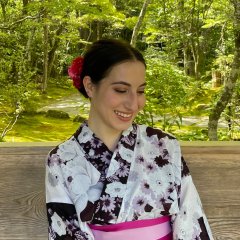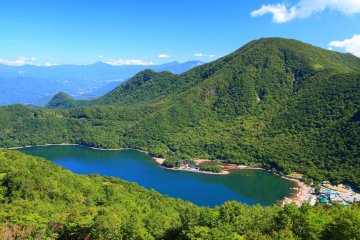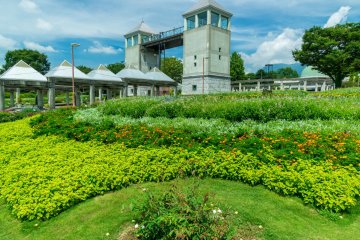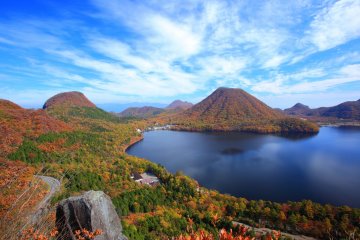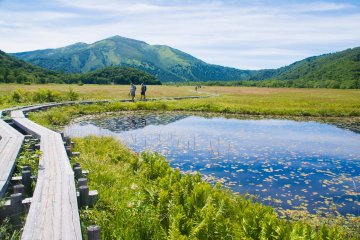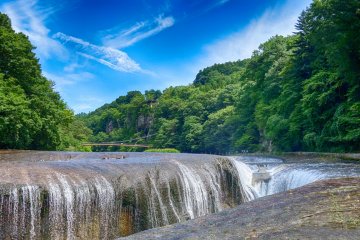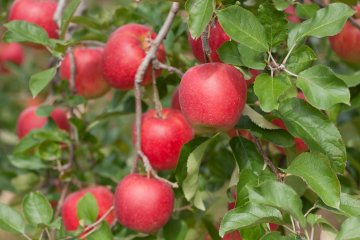In this unprecedented era characterized by social distancing, many people have taken to the great outdoors for safe and inspiring vacations. In addition to the literal space the wilderness provides, it also creates a haven where you can take a break from the monotony of indoor life and rejuvenate your mind and body. Slow down among the trees and find harmony with nature and yourself.
Gunma Prefecture, located northwest of Tokyo, is a nature lover’s paradise thanks to its expansive mountainscape. While the region is renowned for its hot springs, its natural beauty is equally as impressive. Gunma is about a two hour train ride from Tokyo, making it a convenient place for a daycation or multi-day nature trip. Hike through peaceful forests, camp, leisurely boat, and observe the powerful mountains. If you are looking for more energetic activities, Gunma’s diverse landscape also makes it an ideal place for outdoor sports. Try bungee jumping, whitewater rafting, canyoning, skiing, or snowboarding. Listed below are some of Gunma's top outdoor getaways. Take to the mountains and start your next adventure!
Mount Akagi

Mount Akagi is a dominating grouping of peaks in Gunma’s landscape and one of the Three Mountains of Jōmō (old name for Gunma), which are natural icons of the region; the other two being Mount Haruna and Mount Myogi, but more on those later. Mount Akagi dazzles in all seasons with brilliant greenery in spring and summer, warm toned leaves in autumn, and snow covered grounds in winter. On clear days, the mountain’s vibrancy shines against the blue skies and nearby lakes, making for an awe-inspiring visual. Hike at your own pace and enjoy the scenic views of Lake Onuma, which is located at the mountain’s base, or try your hand at more intensive hiking, trekking, and mountain climbing. Be sure to hike up to one of the mountain’s summits for spectacular lookout views.
Kaneko Seeds Gunma Flower Park

Kaneko Seeds Gunma Flower Park is located south of Mount Akagi and is known for its beautifully arranged flower displays. Most popular is the park’s spring exhibit of roughly 160,000 tulips, which peak in Mid-April. The colorful blooms are perfectly arranged in linear and curved patterns, making for a satisfying view that is guaranteed to leave a smile on your face. Tulips aside, Gunma Flower Park also features a variety of blooms including irises, hydrangeas, and roses, found in its central floral display, English garden, Japanese garden, and greenhouses. After strolling through the park, climb up the garden’s centrally located tower for aerial views of the colorful grounds. From early November to early January, the park lights up with illuminations that warm the chilled air with a jovial aura. The peaceful grounds are a wonderful place to stop and smell the roses.
Mount and Lake Haruna

For a unique trip, visit Lake Haruna, which is located 1,100 meters above sea level in Mount Haruna’s caldera. Mount Haruna, a dormant volcano, is one of Gunma’s most iconic mountains, and is a popular hiking spot thanks to its phenomenal summit views and surrounding nature. Ascend to the top of Haruna Fuji, which is one of the mountain’s symmetrical projections that resembles Mount Fuji, by foot or via a ropeway for breathtaking panoramas of the landscape.
Lake Haruna is home to a plethora of relaxing as well as high energy activities. During the warmer months, rent a canoe, rowboat, or swan-shaped paddle boat and drift along the calm waters as you soak in the sun and scenery. If you are looking for an extended stay in the area, reserve a campsite and spend your night by the lakeside. For more heart pumping activities, rent a bike to cycle around the lake, or even try your hand at horseback riding! In early August, don’t miss the area’s fireworks festival along the water. The thousands of colorful blasts glow bright in the night sky and reflect magically off of Lake Haruna. However, do not forget the lake during wintertime as it becomes a popular spot for ice-fishing and skating. Try to catch the area’s wakasagi fish, or if you are not fishing-savvy, simply try the local delicacy in the surrounding onsen town.
Minakami

Nature lovers rejoice! Minakami, located in northern Gunma, has become a popular destination among Tokyoites thanks to its natural beauty and diverse range of activities. Create a perfect getaway that balances relaxation and heart-pounding sports with the town’s onsens, ski resorts, and mountainous environment.
One of the most scenic spots in Minakami is Mount Tanigawa. This majestic mountain, located on Gunma’s border, offers spectacular views from its summit in all seasons and is easily accessible via the Tanigawadake Ropeway. Breathe in the fresh mountain air and enjoy aerial views of the surrounding wilderness as you ascend the mountainside. For experienced hikers, the slopes also provide challenging mountain climbing opportunities. During winter, the mountain becomes a hotspot for winter sports thanks to its powdery snow and long ski season. For an unforgettable wintertime adventure try skiing, cross country skiing, snowboarding, or snowshoeing on Mount Tanigawa or at another one of Minakami’s renowned snow resorts.
As winter gives way to spring, Mount Tanigawa’s melting snow feeds into the Tone River, creating perfect conditions for water sports. Go whitewater rafting, canyoning, and kayaking in the rushing waters, and for additional thrills, try bungee jumping over the Tone River! On land, journey through the countryside on a mountain bike. Create a personalized adventure at your own pace in Minakami, and end the day at one of its famous onsens.
Mount Myogi

Mount Myogi, which is actually a collection of mountains, is nationally renowned for its rare geological formations. The towering peaks dominate Gunma’s forested landscape with steep and jagged formations that make for breathtaking views. Visit Mount Myogi in spring when the rugged rocks are decorated with vibrant green leaves, or in autumn, when the mountainscape is set ablaze with yellow, red, and orange foliage. Mount Myogi’s unique formations can make for challenging hikes, and, for experienced mountain climbers, offer thrilling climbs to the higher peaks. Be sure to research the trails beforehand, and find ones that match your skill level. Regardless of which mountain path you choose, the natural beauty of the area is guaranteed to mesmerize you.
Visit Myogi Shrine, which is nestled on the mountainside and rejuvenate your mind and body with a walk through the tranquil shrine grounds. Then continue your spiritual healing with a hike through Mount Myogi’s naturally alluring environment.
Okushima Lake

Do blue-green crystal waters surrounded by forest covered mountains sound appealing to you? If so, visit Okushima Lake! This artificial lake, located in the resort town of Shima Onsen, was created by the Shimagawa Dam and is famous for its “Shima Blue” water, making it a scenic spot for outdoor activities. Canoe or paddle board on the turquoise waters and experience the surreal sensation of floating on the transparent lake. Back on land, you can walk or rent a bike to ride around the lake and take in the scenery from different perspectives. Okushima Lake’s vibrancy shines in all seasons and is equally complemented by summer and spring greenery, vibrant autumn leaves, and winter snow. Do not miss the magical waters.
Oze National Park

Oze National Park is a grand expanse of unspoiled nature that extends across multiple prefectures and is known for its extraordinary mountainscapes, marshlands, forests, lakes, and waterfalls. This diverse landscape makes the park an ideal destination for hikers, and its most well known spot is Ozegahara Marshland. Walk along wooden boardwalks through the marshlands and observe endless meadows marked by reflective ponds that mirror the sky and surrounding mountains. In late spring, white skunk cabbages bloom across the marshland, covering the area in beautiful white blossoms. Equally coveted views occur during mid-summer when yellow alpine lilies paint the landscape golden or in mid-autumn when the area’s grass turns vibrant yellow and red. The well maintained walkways have no majorly difficult inclines, but be sure to dress appropriately for a multi-hour hike if you want to explore the area.
For more experienced hikers, Oze’s mountains provide challenging climbing and hiking opportunities along its mountain trails. Be sure to prepare appropriately for the treks, which can start at a minimum of four hours, with proper equipment and clothing. The park also has mountain huts and campgrounds, which, in addition to lodging, provide valuable park information. With a nearby place to stay, you can start your morning with a sunrise over the majestic Gunma landscape and end your day with amber rays at sunset.
Oze National Park is also a symbol of nature conservation in Japan and a sustainable travel destination. The park’s “Take Garbage Home” initiative, which was introduced in the 1970s, helped restore the damaged ecosystem and sparked reform across the country. Play a role in preserving the pristine environment by respecting the park’s guidelines.
Fukiware-no-Taki Falls

Often compared to North America’s Niagara Falls, Fukiware-no-Taki Falls rises seven meters high and extends 30 meters wide for an impressive visual. Hear the roar of rushing water, feel cool mist on your skin, and observe the frothy white falls and surrounding dense forests. Visit the waterfall during springtime when it is strongest due to fuel from snowmelt or during autumn, when the surrounding foliage changes color. You can view the waterfall from the nearby suspension bridge for aerial perspectives or stand right beside it for an up close experience. Please note that the waterfall is closed during winter.
Harada Farm

As you explore the natural beauty of Gunma, why not also taste the fresh produce that it yields? Harada Farm (Kajitsu no Sato Harada Farm), located in Numata City, is an interactive farm where you can pick your own fruits and vegetables year-round. Depending on the time of year, you can harvest strawberries, cherries, apples, peaches, grapes, cucumbers, tomatoes, eggplants, radishes, cabbage, and mushrooms from its spacious fields. After filling your baskets with your pickings, stop by the farm’s shop, which sells homemade cakes, pies, juice, and other delicious products.
Tambara Lavender Park

Envision fields of purple under blue summer skies. Tambara Lavender Park makes this vision a reality. The unique park is located at an elevation of 1,350 meters on an off season ski slope and is open from early July to late August. From the entrance, walk on a slight incline to the park’s hillside area, which features the majority of the flowers, or take a chair lift up for beautiful aerial views. Walk among the over 50,000 lavender plants, and immerse your senses in the sea purple. Aside from lavender, the park also features sunflowers, hydrangeas, daylilies, and marigolds to ensure a colorful experience. After your time among the flowers, be sure to try the park’s famous lavender soft serve ice cream!


